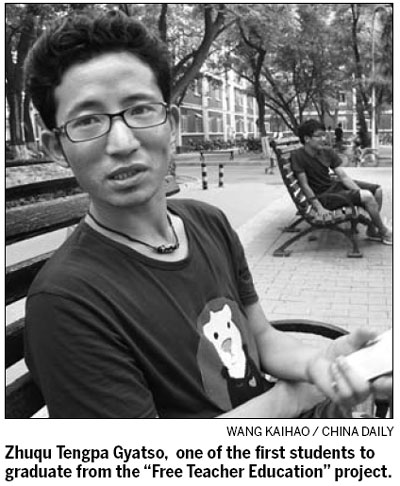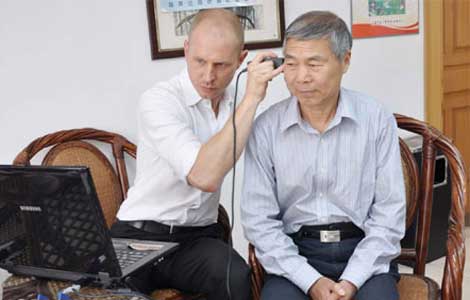Society
Education is the key to destiny
Updated: 2011-08-22 07:41
By Wang Kaihao (China Daily)

After holding a graduation dinner and taking photos with his classmates at the School of Chinese Language and Literature of Beijing Normal University, Zhuqu Tengpa Gyatso's next stop will be a junior high school in Ngari prefecture, Tibet autonomous region.
"I'm worried that I won't be able to update my micro blog because the Internet in Ngari is inconsistent," says the 26-year-old, who was born in Tibet and is about to become a teacher.
He is one of the first students to graduate from the "Free Teacher Education" project, that was launched in 2007 and offers free education to hundreds of students at six Chinese universities every year. In return they have to work in their hometown elementary or high schools for 10 years after graduation.
Zhuqu Tengpa Gyatso learned how to teach during his four years at university, in addition to taking courses on Chinese literature. He also took part in an annual chalk handwriting competition, as it is indispensable for Chinese teachers working in rural areas.
"Regular college tuition fees would have been a burden for my family," says the first college student from his hometown of Kemar township in Zhongba county. "However that's not the only reason why I chose to join the project. If you go to my hometown, you will understand why."
He was raised to be a shepherd, like the rest of his family. It was his father who wanted a different life for him.
"When my dad took me to school for the first time, some neighbors thought it was because we were so poor we needed government support."
His father used to have a retail business in Lhasa, capital of the autonomous region, but it failed. Even so, his experience of city life convinced him of the need for education.
"My father knew education was the key to change destiny," Zhuqu Tengpa Gyatso says.
In June 1998, he took part in the entrance exam for "Tibet Middle Schools", which are actually junior high schools for Tibetan children outside of Tibet autonomous region. He and his parents waited two months for news of the results and were not informed he had passed until the day for enrollment had passed, as the letter of admission did not arrive.
"There was no road to my home at the time and a big river often blocked the way in summer," he says. "Because of this I lost my opportunity."
"My father was depressed for a long time and he decided to keep me away from school, so I prepared to be a shepherd like everyone else."
Six months later, however, Badar, a teacher at his elementary school, changed his life.
"Badar rode a jeep along the rugged wasteland in the cold wind of January all the way from the county seat to my home to tell my father to try again."
Badar was among the first group to study at a Tibetan Middle School in the 1980s.
"I wanted to be a person like him so I decided to return to school," Zhuqu Tengpa Gyatso says.
After five months of revising, he retook and passed the exam again and eventually received his admission letter.
He was one of just two students in Zhongba county who passed the exam.
It took him two days to make his first trip to Lhasa, after which he flew to Jinan, capital of Shandong province, which is where he started what would be 11 years of study.
"Unlike my classmates, I barely knew Mandarin when I first arrived in Jinan," he says in now fluent Mandarin.
Each summer vacation he returned to Zhongba county as an intern teacher.
"Too many children in rural areas drop out of school, and the main reason is their parents consider the years spent at school to be meaningless, or the children themselves think learning is too difficult."
"I cannot change the situation in the county completely," Zhuqu Tengpa Gyatso says. "I just want to help those I can to become someone like me or Badar."
China Daily
E-paper

Blue economy gets a lift
Coastal areas of Shandong, Zhejiang and Guangdong to spearhead sector development.
The light touch
Long way to go
Outdoor success
Specials

Star journalist remembered
Friends, colleagues attended a memorial service to pay tribute to veteran reporter Li Xing in US.

Hot pots
Tea-making treasures catch the fancy of connoisseurs as record prices brew up interest

Hear we go
Polish Audiologist helps thousands of Chinese hear for the first time.
